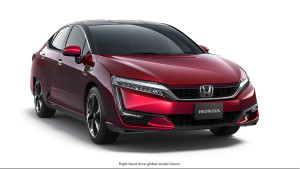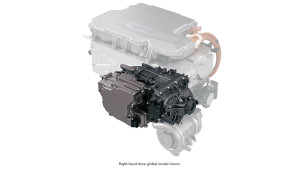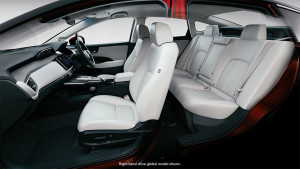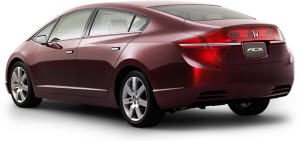On Sale in Late 2016; Competes with Toyota Mirai, Hyundai Tucson
The slow roll-out of fuel cell vehicles continues, as if the chicken-or-egg discussions about whether the vehicles or infrastructure should has slowed down all forward progress. With Asian rivals Hyundai and Toyota on the market in California with their fuel cell cars, it was only a matter of time until Honda entered the slowly unfolding race to get hydrogen-fueled cars into the mainstream.

At the November 2015 Los Angeles Auto Show Honda showed off the version of its Clarity fuel cell car that will go on sale in about a year. It is similar in size to the Toyota Mirai it will join in the marketplace, with an understated design that we’ve come to expect from Honda. Some of the more radical styling features of the concept versions shown earlier have been dropped and the Clarity will easily fit in the showroom alongside Accords and CR-Vs and barely attract attention from anyone who doesn’t follow advanced technology.
For those who do follow what we consider the most exciting part of the automotive world, the new Honda Clarity (it continues the nomenclature of Honda’s last generation fuel cell car) offers

some updated technology and the kind of features normally found in Hondas. The company has shrunk the fuel cell stack by 33 percent compared to the last generation and given the recovered room to the interior, resulting in more seating space than is found in a midsize Accord. Honda’s also porting its infotainment technology over, offering Apple CarPlay and Android Auto in the Clarity. The suite of safety/technology features known collectively as Honda Sensing also will show up in the fuel cell car. Honda expects the Clarity to deliver more than 300 miles from a full tank of hydrogen and be able to be refueled in less than three minutes.

Of course, only water vaper comes out of the Clarity tailpipe, which is the car’s biggest environmental selling point. From Clean Fleet Report’s drives of previous generations of Honda fuel cell cars, Clarity drivers can expect performance like that of most electric cars—that is, quiet, responsive driving with a good road feel. If the interior characteristics of the model on display in LA are carried into production, buyers can also expect some luxury touches and a classic Honda interior with well-laid-out gauges and controls.
The bigger question about fuel cell cars remains—where do you get fuel? California is investing tens of millions of dollars into building stations to supply hydrogen for FCEVs in Southern and Northern California. All appears to be roughly on pace to keep up with the sluggish fuel cell vehicle rollout. Other hydrogen vehicle activity is taking place in a couple other spots in the U.S. as well as in Korea, Japan and Europe. It’s going to be a slow ride as this new technology seeks to displace not only traditional gas and diesel vehicles, but also electrics and plug-in hybrids by offering a vehicle

that is a closer approximation of the type of driving and fueling experience we’re used to. There may be room for all of these technologies to co-exist, but it does create a complicated marketplace for consumers. Initially, FCEVs like the Honda Clarity will likely appeal to early adopters and tech-savvy folks willing to trade off the embryonic infrastructure for a chance to experience cutting-edge technology. It’s much like the first EVs. That phase is expected to carry the cars toward the next generation of smaller, cheaper powerplants that should help expand the cars’ reach while a growing infrastructure makes them easier to use in the real world. Navigant Research predicts we’ll see 228,000 fuel cell cars on the road by a decade from now. It’s going to be fun to watch and will undoubtedly not be a smooth ride, but expect some memorable cars along the way.
Related Stories You Might Enjoy:
Toyota Mirai Hits the Market
First Drive: 2016 Toyota Mirai
2014 LA Auto Show: A Hydrogen Milestone

5 thoughts on “Honda Clarity Production Fuel Cell Model Introduced”